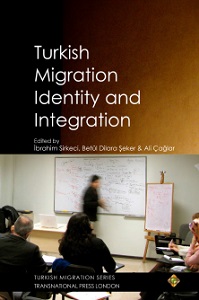“Rewriting” Turkish-German cinema from the bottom-up: Turkish emigration cinema
“Rewriting” Turkish-German cinema from the bottom-up: Turkish emigration cinema
Author(s): Ömer Alkin
Subject(s): Post-War period (1950 - 1989), Transformation Period (1990 - 2010), Present Times (2010 - today), Film / Cinema / Cinematography, Migration Studies, Politics and Identity, Identity of Collectives
Published by: Transnational Press London
Keywords: Turkey; cinema; emigration cinema; Turkish-German cinema; transnationalism;
Summary/Abstract: Films from Germany dealing with any aspect of Turkish-German migration, such as the box-office successes Fack Ju Göhte (2014) and Almanya – Welcome to Germany (2011) are often considered as “TurkishGerman cinema”. Nevertheless, what first comes to mind with this problematic term of “transnationalism” in the field of film (Higbee & Hwee, 2010) are the internationally celebrated films Head On (2004) and Edge of Heaven (2007) by Turkish-German director Fatih Akin. However, the term is to be questioned. Which parameters determine the belonging of a film to Turkish-German cinema? Is a film by a German director with Turkish migration background already a Turkish-German film due to the transcultural biographical reference of the director, even if the film does not contain any references to the social reality of Turkish migration, as it is the case in the Hollywood mystery film Premonition (2007) by director Mennan Yapo – which would be an essentialist and biologistic understanding of national cinema? For a discussion of the term it is crucial to analyse comprehensively the historical context. The fact that this does not happen becomes apparent in the marginal position of the Turkish films in the discourse regarding Turkish-German cinema. The Turkish films about emigration from the 1970’s and 80’s by Turkish directors like Serif Gören or Yavuz Figenli are not considered as a part of this transnational film history. But ‘Turkish-German film’ history has already attracted a considerable amount of academic interest (e. g. Burns, 2006, 2007, 2013, Göktürk, 2000a, 2000b, Ezli, 2009, 2010, Halft, 2011, Hake & Mennel, 2012) without really considering what the term actually refers to. I want to critique such writing because I will argue that it reproduces Eurocentrism and an epistemological one-sided-ness. Before giving arguments for a more comprehensive understanding of Turkish-German cinema, which includes Turkish emigration cinema, it is useful to understand the discussions surrounding the academic writing of the history of Turkish-German cinema first. It offers an insight into film history that can be read as a two-stage process of the appropriate representations of Turkish emigrants in Germany.
Book: Turkish Migration, Identity and Integration
- Page Range: 115-130
- Page Count: 16
- Publication Year: 2015
- Language: English
- Content File-PDF

